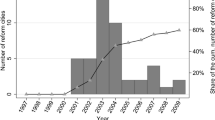Abstract
Chinese economic reform appears to be following the path of outgrowing rather than jettisoning the central plan, perhaps to reduce the risk of considerable urban unemployment and its potential for social instability. How has this strategy affected the development of a labor market in China? Under the pre-reform labor system, urban workers were assigned to jobs, left therefor a lifetime, and given nearly equal pay regardless of performance. Today, many redundant workers remain in state-owned enterprises. Housing and welfare reforms have proceeded slowly, leaving many obstacles in the path of job mobility. Despite the incomplete nature of the labor market reforms, change is profound. A labor market has emerged and, nascent as it may be, it is affecting behavior in significant ways.
Similar content being viewed by others
Author information
Authors and Affiliations
Rights and permissions
About this article
Cite this article
Maurer-Fazio, M. Labor Reform in China: Crossing the River by Feeling the Stones. Comp Econ Stud 37, 111–123 (1995). https://doi.org/10.1057/ces.1995.44
Published:
Issue Date:
DOI: https://doi.org/10.1057/ces.1995.44




